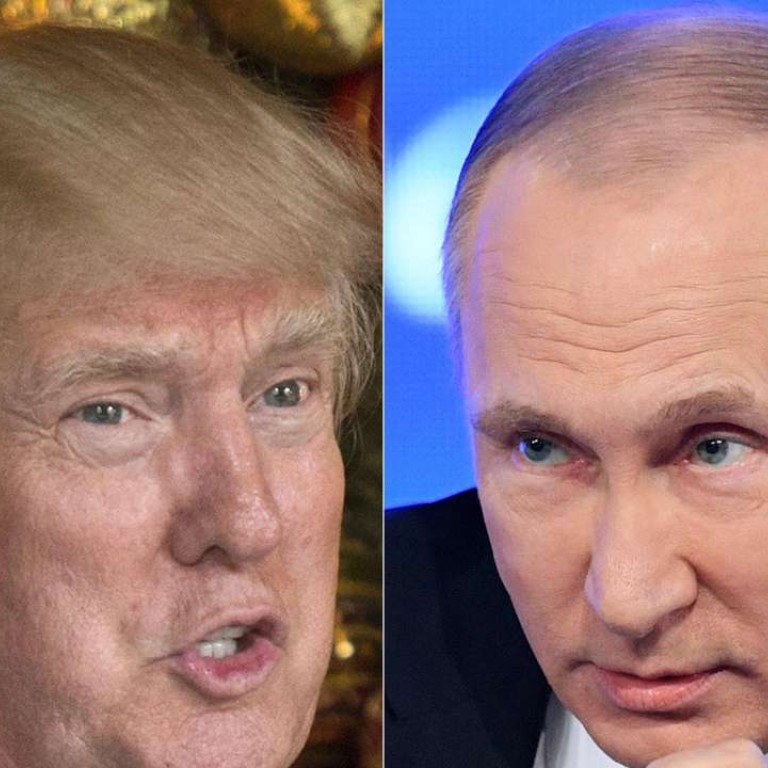
Tough on Putin, soft on Trump? Republicans walk a tightrope over Russian hacking
Senate Republicans walked a tightrope on Thursday trying to show their toughness against Vladimir Putin’s Russia without undermining the legitimacy of president-elect Donald Trump’s victory in November.
Again and again during a Senate Armed Services Committee hearing on Russian cyberattacks, conservative hawks found themselves in the awkward position of talking tough against Putin – and talking even tougher about the validity of Trump’s election over Democrat Hillary Clinton.
Why? Because weakening Trump threatens to weaken them, also.
As reluctant as most Capitol Hill Republicans were to embrace Trump during the campaign, his swearing-in two weeks from now gives them an opportunity to implement the kind of sweeping conservative agenda that has eluded them since the second term of George W. Bush’s presidency entered a downward spiral of unpopularity.
Many Republicans want to be on the right side of history in standing up to Putin, who US intelligence officials say led a massive effort to undermine the presidential election. But they also understand the need to protect Trump’s standing at home.
Already, the president-elect is poised to enter the Oval Office on January 20 as the least popular new president in the modern polling era. On Thursday, congressional Republicans made clear that they are determined to reassure Americans that Trump won on the merits.

Take the questioning by Senator Tom Cotton, an Army veteran of Iraq and Afghanistan who just two years into his first term has become one of the Senate’s leading national-security hawks. In recent media appearances, Cotton has criticised President Barack Obama as being insufficiently aggressive toward Putin and urged Trump to take a stronger posture.
During his five minutes of questioning Thursday, Cotton accepted the general conclusion that Russia oversaw the hacking of email accounts at the Democratic National Committee and Clinton campaign. “OK, so that’s what happened,” Cotton said. “That’s why it happened, or at least a preview that we’re going to know why it’s happened. Let’s move on to the impact.”
But Cotton then asked Director of National Intelligence James Clapper Jnr whether any evidence had emerged that media stories about the emails or a flurry of fake news stories emanating from Russia had affected actual voting.

Clapper had already said that the intelligence community was not the right entity to examine American voters’ intentions. “That’s something that’s more suited for someone like Sean Trende or Michael Barone or Nate Silver,” Cotton said, naming political analysts who have written about the 2016 elections.
“Well, it certainly isn’t the purview of the US intelligence community,” Clapper said.
Cotton thanked Clapper and ended his questioning.
The awkward dance also was apparent in the way Republicans treated Clapper and the entire intelligence community: sometimes respectfully and sometimes less so.
Like almost every other Republican, Senator Thom Tillis began his remarks by thanking Clapper and expressing “high confidence in the community that you represent.” It was a sharp contrast to Trump’s willingness to insult intelligence agencies publicly and his continued reluctance to accept their claims of Russian meddling.

Yet Tillis then launched into a line of questioning that resembled liberal criticism of intelligence agencies in the 1970s. He cited a statistic that U.S. intelligence agencies have intervened in other countries’ elections 81 times, more than twice the level of meddling thought have been committed by Russia, and he said that Americans live in a “glass house” for criticising Putin’s recent actions.
Even Senator John McCain, the committee’s chairman and perhaps Capitol Hill’s fiercest critic of Putin, praised Clapper for conducting a review of the Russian meddling without declaring how much Trump did or did not benefit from the foreign interference.
“The goal of this review, as I understand it, is not to question the outcome of the presidential election, nor should it be,” he said in his opening remarks. “As both President Obama and president-elect Trump have said, our nation must move forward. But we must do so with full knowledge of the facts.”

In an interview later, McCain said he had not seen any evidence that suggested votes were changed by the Russian effort. “Unless they can prove that they affected the election, we have to assume that they didn’t. I mean, it’s the old ‘innocent until proven guilty.’ Now there’s no doubt that they hacked in and they wanted to, obviously, but there’s no evidence that I’ve seen that they were able to succeed,” he said. McCain, after calling for a special committee to conduct a sweeping investigation of the cyberattacks, has accepted the decision by Majority Leader Mitch McConnell, to leave the issue to the existing committees.
That leaves a serious challenge for Democrats: whether to accept investigations designed only to examine the means of the Russian interference without trying to determine whether those efforts affected the electoral outcome.

Is that the sort of investigation that should occur through an independent commission? Or is it one that Democrats will have to do on their own in preparation for the next presidential campaign?
For now, some senior Democrats are pleased that most Republicans are willing to accept the proposition that Putin’s operatives were trying to meddle in the US election campaign.
“I think they recognise the evidence is overwhelming that Russia was involved in the election, purposely, deliberately, authorised at the very highest levels, and that’s a fact, and they acknowledge the fact,” Senator Jack Reed, the ranking Democrat on the Armed Services Committee, said in an interview after the hearing.
Reed thinks that Thursday’s hearing and Clapper’s report, likely to be released sometime next week, also will solidify the public’s view that Russia was behind what was a massive effort.
But after that, it’s not clear what the next steps will be.

